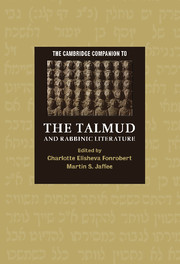Book contents
- Frontmatter
- Introduction: The Talmud, Rabbinic Literature, and Jewish Culture
- Part I: The Conditions of Rabbinic Literary Activity
- Part II: The Genres of Rabbinic Literary Composition
- Part III: Hermeneutical Frames for Interpreting Rabbinic Literature
- 11 The “Other” in Rabbinic Literature
- 12 Regulating the Human Body: Rabbinic Legal Discourse and the Making of Jewish Gender
- 13 Rabbinic Historiography and Representations of the Past
- 14 Rabbinical Ethical Formation and the Formation of Rabbinic Ethical Compilations
- 15 Hellenism in Jewish Babylonia
- Bibliography
- Index
- Source Index
- Series List
13 - Rabbinic Historiography and Representations of the Past
from Part III: - Hermeneutical Frames for Interpreting Rabbinic Literature
Published online by Cambridge University Press: 28 November 2007
- Frontmatter
- Introduction: The Talmud, Rabbinic Literature, and Jewish Culture
- Part I: The Conditions of Rabbinic Literary Activity
- Part II: The Genres of Rabbinic Literary Composition
- Part III: Hermeneutical Frames for Interpreting Rabbinic Literature
- 11 The “Other” in Rabbinic Literature
- 12 Regulating the Human Body: Rabbinic Legal Discourse and the Making of Jewish Gender
- 13 Rabbinic Historiography and Representations of the Past
- 14 Rabbinical Ethical Formation and the Formation of Rabbinic Ethical Compilations
- 15 Hellenism in Jewish Babylonia
- Bibliography
- Index
- Source Index
- Series List
Summary
At the very conclusion of his monumental Antiquities of the Jews, the noted Jewish historian Josephus, sensing that what he had just achieved was the exception, rather than the rule, among Jewish intellectuals of his day, indulges in a measure of self-adulation. Singularly among the learned men of his day, he claims, he alone has succeeded in bridging the gulf between Greek learning, apparently a sine qua non for the historiographical achievement embodied in the Antiquities, and a curriculum that was far more revered among his Jewish compatriots: “For our people . . . give credit for wisdom to those alone who have an exact knowledge of the law and who have the capability of interpreting the holy writings.” This hierarchy of Jewish knowledge, he seems to be saying, relegated historiographical undertakings of the Hellenistic-Roman model to a somewhat neglected status, and while he does not chastise his fellow Jews for this neglect, one might conclude that those who did devote themselves to the study of the law and its interpretation felt no pangs of remorse for not embracing a pursuit of the past in the critical manner of their Greco-Roman counterparts.
Indeed, the variegated corpus of rabbinic literature did not preserve any work that might point to an effort on the part of the rabbis at producing a systematic and critical study of the past. To be sure, the biblical past was at the center of much of their deliberations, but this “past” was for them already laid out in its fullest detail, thereby providing the basis for an ongoing search of its religious significance, and hardly requiring any compilation and examination of sources in a Thucydidean-type search for “truth” and “accuracy.”
- Type
- Chapter
- Information
- The Cambridge Companion to the Talmud and Rabbinic Literature , pp. 295 - 312Publisher: Cambridge University PressPrint publication year: 2007
- 7
- Cited by



